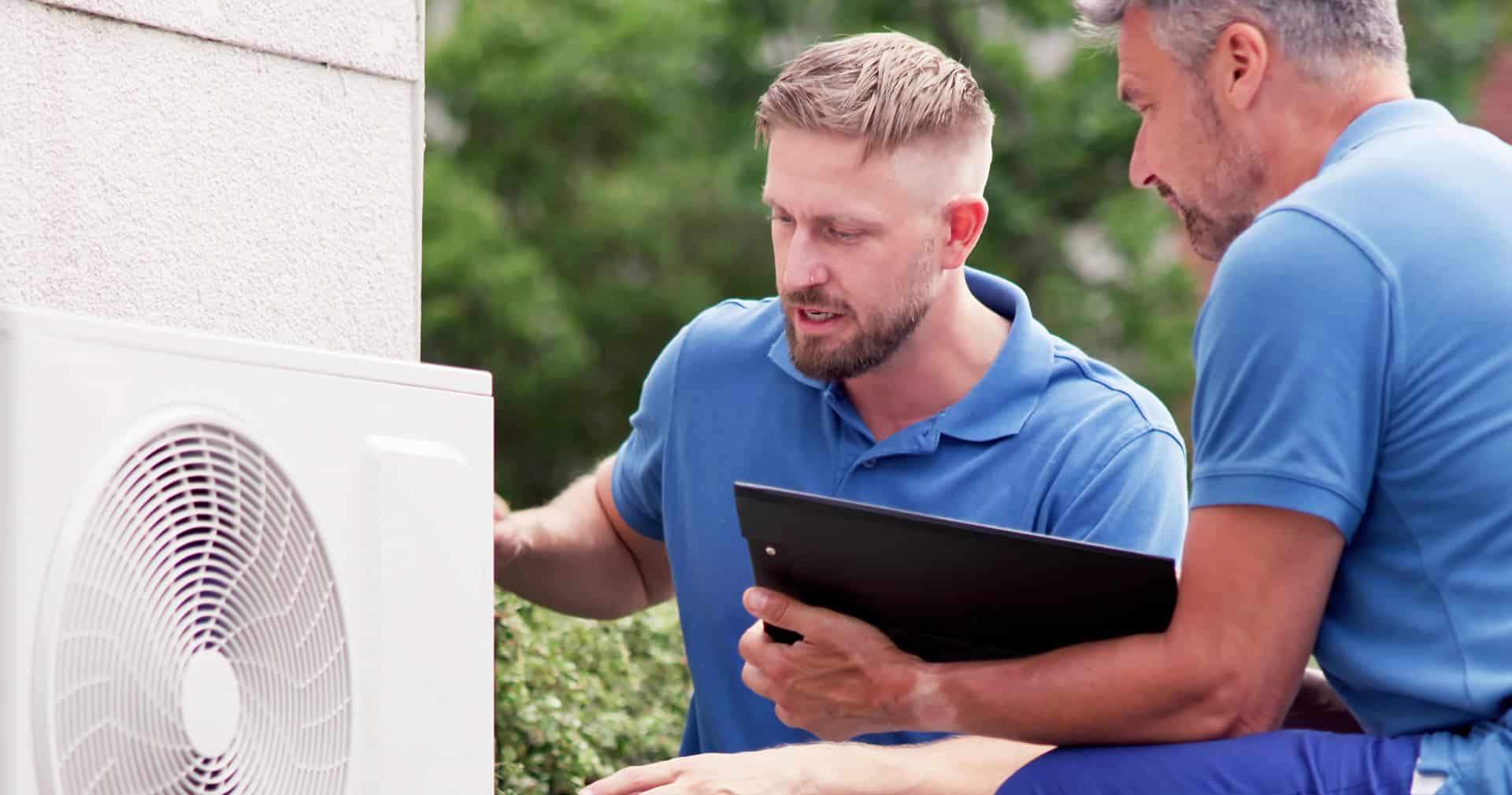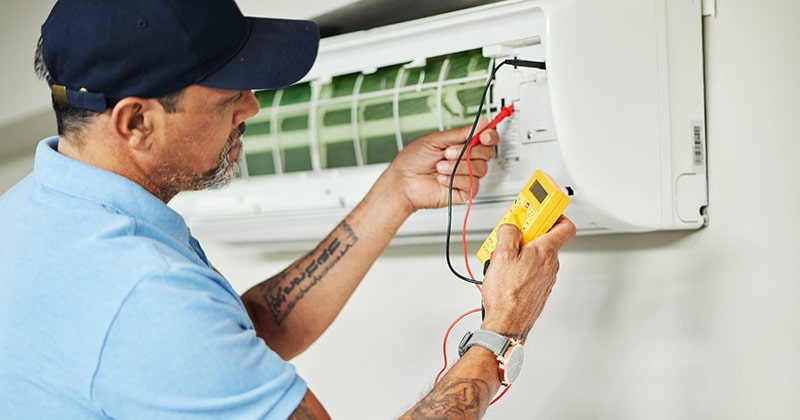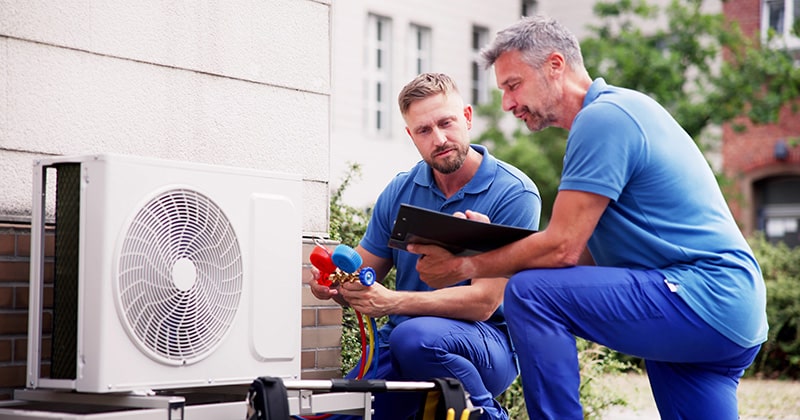
If you want to become an HVAC technician or contractor, you’ll need an HVAC license. But where should you start? And what are the required steps to get your license?
In this article, we’ll walk step-by-step through the licensing process for HVAC technicians. We’ll cover how to identify licenses for different HVAC career paths. Then, discuss the education and experience requirements for an HVAC license.
We’ll wrap up with a license application checklist and practical tips to begin pursuing your HVAC license.
Let’s get started.
The Difference Between HVAC License and HVAC Certification
You may not be sure if an HVAC license is the same as an HVAC certification. Many contractors understandably confuse licensing and certification. So, let’s clarify this first.
HVAC certification is professional accreditation for HVAC technicians. It confirms that you’re qualified to work on HVAC systems.
HVAC certifications are typically granted after completing a course and (or) passing an exam. While the state issues HVAC licenses, certifications are awarded by a host of organizations, such as:
- ESCO Group
- North American Technical Excellence (NATE)
- Refrigerating Engineers and Technicians Association (RETA)
- Refrigeration Service Engineers Society (RSES)
- Environmental Protection Agency (EPA)
However, HVAC certification and licensing often go hand in hand. In many states, you must possess certain certifications to get an HVAC license.
RELATED ARTICLE: How to Get HVAC Certified

Why It’s Important To Have Your HVAC License
Having an HVAC license can open new doors for you or your contracting business. An HVAC license is more than just a piece of paper.
Getting licensed is a means to:
- Meet legal, insurance, and bonding requirements
- Unlock your eligibility for various HVAC jobs
- Showcase your competence in HVAC services
- Expand your HVAC contracting opportunities
- Increase your HVAC earning potential
That’s about it for the “what” and the “why.” Now, let’s talk about how to get an HVAC license.
Research HVAC Career Paths
HVAC is a broad industry. The field offers a wide range of specialized career paths. There are several options, whether you’re looking for employment opportunities or starting your own HVAC contracting business.
Here are the nine main HVAC specializations and career paths available for contractors:
HVAC Installation
HVAC installation technicians set up and commission new HVAC systems. Installations can be done in residential homes or commercial buildings.
However, technicians may need separate licenses for residential and commercial HVAC installations. This is the case in states such as Oregon and Alaska.
HVAC installers work closely with architects, homeowners, building managers, and other contractors. This is because HVAC installation touches on every aspect of a building’s design. Everything, from the structure and plumbing layout to electrical wiring, must come together to accommodate an HVAC system.
FROM ONE OF OUR PARTNERS: Commercial HVAC Services vs Residential HVAC Services
HVAC Repair and Maintenance
HVAC repair and maintenance involves servicing HVAC systems. Repair technicians also troubleshoot and fix malfunctioning HVAC units.
HVAC installers and repairers carry the same license. But again, depending on your state, you may need different commercial and residential work licenses.
Solar HVAC
Solar-powered HVAC systems are growing in popularity—and for good reasons. Running a medium-sized residential air conditioner on the grid can cost as much as $108 monthly. Using solar power drastically cuts HVAC energy costs.
And as a bonus, solar energy is clean and renewable.
This growing interest in solar energy creates career opportunities in solar HVAC. However, you’ll need various certifications and licenses to become a solar HVAC technician. For instance, working with roof-mounted solar PVs may require roofing and electrical contracting licenses.
Energy Auditing
Energy auditors assess HVAC systems’ performance and check whether equipment needs to be repaired, upgraded, or replaced. They aim to ensure that every HVAC system is as efficient as possible.
Energy auditing is more of a certifiable skill set than a licensed trade. So, all you’ll need is an energy auditor certification from a reputable institution and a state-issued contractor’s license to operate as an energy auditor.
HVAC Design Engineering
HVAC engineers design and implement HVAC systems in homes, commercial establishments, and industrial buildings. They work closely with contractors and architects to design efficient systems that match specific needs.
Ideally, you’ll need a bachelor’s degree in mechanical or HVAC design engineering to pursue this path. An engineering certification is enough to get you started. However, you may need a license to work on certain projects, particularly in the public sector.
Indoor Air Quality Inspection
An indoor air quality inspector assesses air quality in homes and other buildings. They check for hazardous air pollutants such as mold, particulate matter, and carbon monoxide (CO). After the assessment, they make recommendations to improve indoor air quality.
Most states won’t require you to have a license to perform air quality tests. However, you must be formally trained and certified to do the job.
Refrigeration Mechanics
Refrigeration technicians, or refrigeration mechanics, work with refrigerated systems. These include your typical fridges, beverage machines, and walk-in coolers.
Most states require technicians working with such systems to have a refrigeration license. Before that, refrigeration mechanics must complete formal training, pass an exam, and acquire EPA certification.
HVAC Sales
Working in HVAC sales doesn’t require any licensure. But you do need people skills and a deep understanding of HVAC equipment.
You can work as a sales representative for an HVAC company or run your own intermediary HVAC business. With the latter, you’ll get paid to connect HVAC manufacturers/contractors with HVAC customers.
Entrepreneurship
How about starting your own HVAC contracting business?
You don’t even have to be an HVAC technician yourself. You could hire qualified and licensed HVAC experts to work on your behalf. However, many states require at least one equity partner in the business to be licensed. If you plan to be a sole owner, you will need a license in those states.
Regardless, you’ll definitely need a good understanding of the industry. More importantly, you’ll need strong entrepreneurial skills to hack it in the competitive and dynamic HVAC business landscape.
You’ve seen the options; what do you want to do?
Choosing a career path, especially in an unfamiliar industry, can be daunting. To help you out, here are some important factors to consider in finding the right path for you:
- Passion and interests: What interests you most in the HVAC industry? Are you passionate about working in HVAC in the first place? Remember that famous quote: “Find a job you enjoy doing, and you will never have to work a day in your life.”
- Your career goals: Determine what’s motivating your career change. It could be a better salary, work-life balance, professional fulfillment, etc. More importantly, how far do you want to take it?
- Difficulty: How difficult is it to pursue a given career path? As we’ve seen, some HVAC specialties are more challenging than others.
- Skills and abilities: What are you best at? You might be a natural problem-solver, strategist, leader, negotiator, etc. Choose a career path that aligns with your professional qualities, skills, and talents.

Educational Requirements for Licensed HVAC Technicians
The first step to becoming an HVAC technician is enrolling in HVAC training. There are two main ways you can train as an HVAC technician:
Learn On the Job
Learning on the job could mean one of two things: apprenticeship or on-the-job training. The two may sound similar, but they’re pretty different.
With an apprenticeship, you typically work under one or more experienced technicians. You essentially shadow your mentor, participating in and learning from what they do. Eventually, you’ll have picked up enough skills and knowledge to work solo.
HVAC apprenticeship programs can take anywhere between one and five years. The duration will depend mainly on your learning speed.
Most apprenticeship programs are sponsored by the employer. In this case, the employer might be an HVAC contractor, distributor, or manufacturer.
On-the-job training is a bit more formal and takes less time (one to two years). You learn by working under the guidance of more knowledgeable or experienced colleagues. Coursework is also offered alongside hands-on learning.
The main difference between on-the-job training and apprenticeship is the learning scope. With apprenticeship, you only learn the skills necessary for a particular job. On the other hand, on-the-job training aims at full HVAC proficiency.
RELATED ARTICLE: Mastering the Trade: HVAC Apprenticeships
Enroll in an Accredited HVAC Training Program
Option two is to join a formal HVAC training program. Enroll in any vocational training institute offering HVAC courses. Just make sure the institution or course is accredited. Accreditation comes from organizations such as the ANSI National Accreditation Board and NATE.
Most vocational training schools only require a high school degree or GED.
An HVAC training course typically takes one or two years. You then sit an exam at the end of the course. Passing that exam earns you an HVAC certification. The exact certification will depend on what you studied and tested for.
There are also training programs like ForgeNow, an accredited program that’s eligible for the GI Bill. Their seven-week program gives you the opportunity to earn up to four HVAC certifications.
Consider Specialized HVAC Training
Conventional HVAC training programs only cover the basic skill sets. Regular training might not be enough if you want to specialize in a particular area. Besides, why not enrich your HVAC expertise by learning specialized skills and knowledge?
Specialized courses and certifications are available for a wide variety of topics, including:
- CFC-refrigerated systems
- Indoor air quality testing
- Solar HVAC
- HVAC design and engineering
- Hydronic heating
- Smart HVAC controls
- Energy auditing
- Industrial refrigeration
- Commercial heating and cooling
FROM ONE OF OUR PARTNERS: The Best HVAC Technician Training Programs in the U.S.

Necessary HVAC Experience Before Licensing
HVAC licensure requirements vary widely from state to state. For instance, entry-level HVAC technicians do not need licenses in some states. In others, newbies cannot get their licenses until they’ve worked in an HVAC field for a given period.
Let’s go over some examples of field experience requirements in various states:
- California: To take the HVAC contractor exam, you must demonstrate at least four years of work experience under a licensed contractor.
- Georgia: Eligibility for a Class I License includes four years of experience. Class II requires five years of experience working with AC systems exceeding 175,000 BTU of heating and 60,000 BTU of cooling.
- Idaho: You need 8,000 hours under your belt to qualify for the Unrestricted HVAC License.
- Alabama: HVAC apprentices can get their license after two years and 3,000 hours of work experience under a licensed contractor.
Requirements to Apply for an HVAC License
Again, HVAC licensing requirements vary depending on the state. Some states are more lenient than others. But generally, you must meet the following criteria to apply for an HVAC license:
- At least 18 years of age
- Clean criminal record with no felonies
- High school diploma, GED, or bachelor’s degree
- Proof of completing vocational or on-the-job HVAC training
- Certification for passing HVAC general skills exams
- Proof of work experience under a recognized and licensed contractor
- Payment of licensure fees
- HVAC business insurance (a requirement for independent contractors in some states)
- EPA Technician Certification (for technicians handling refrigerated systems)
Check your state’s HVAC licensing requirements here.
Obtaining Your HVAC License
Anyone wanting to become a licensed HVAC technician must pass a licensing exam. The exam tests your competence in HVAC skills and knowledge.
Every state that licenses HVAC technicians has its own licensing exam. The exam type and requirements are determined by the particular state.
Let’s take California for example. California’s Contractors State License Board (CSLB) issues a Class C Specialty Contractor License—specifically, the C-20 – Warm-Air Heating, Ventilating, and Air-Conditioning Contractor license for HVAC technicians.
To sit the exam, you must meet the following requirements:
- 18 years of age with a valid US-issued ID or driver’s license
- Valid SSN or TIN
- Clean criminal record
- At least four years of HVAC work experience
The CSLB administers and scores the C-20 exam. To get your license, you must pass two exams. That’s the C-20 exam and the Law and Business exam. The exams will cost you between $799 and $949 in fees.
Besides state-issued tests, there are several other HVAC exams. Here are the HVAC certification and specialty exams you’ll want to take:
EPA 608 Test
Most states require HVAC technicians to have EPA 608 Certification. The certification clears you to work on refrigerated systems containing chlorofluorocarbons (CFCs). EPA 608 Certification has four levels:
- Type I: Servicing small appliances
- Type II: Servicing high-pressure appliances
- Type III: Servicing low-pressure appliances
- Universal: Servicing all types of CFC-refrigerated appliances
You must pass the EPA Section 608 Technician Tests to obtain EPA certification. These tests are administered by EPA-approved organizations such as Mainstream Engineering. You can even take the test online.
NATE Professional Certification Exams
NATE offers various HVAC technician exams and certifications. They certify every HVAC skill level, from entry level all the way to senior level. Each exam has unique requirements. But it’s pretty easy to get started at the primary level.
You can study for any test with NATE Training Academy or any NATE-approved school. The same goes when it comes to sitting exams.
HVAC Excellence Exams
HVAC Excellence Certification is a series of stackable progressing levels of technician certification. The exams and certifications are divided into four levels:
- Student Outcome Assessments
- Employment-Ready Certifications
- Professional Technician
- Master Specialist Certifications
Within these levels are several areas of specialization.
HVAC Excellence is a member of the ESCO Group. The ESCO Group is responsible for administering and scoring HVAC Excellence exams. They work with third-party educators to train candidates and proctor exams.
RETA Exams
The Refrigerating Engineers and Technicians Association certifies HVAC technicians in industrial refrigeration.
RETA offers five certification levels:
- CARO – Certified Assistant Refrigeration Operator
- CIRO – Certified Industrial Refrigeration Operator
- CRST – Certified Refrigeration Service Technician
- CRES – Certified Refrigeration Energy Specialist
- RAI – RETA Authorized Instructor
Earning any of these credentials means passing an exam. Fortunately, RETA has a vast library of training materials, including practice exams. They also provide online training for exam candidates. You can also study and sit exams with the various RETA-accredited institutions.
HVAC License: Where to Start
- Research HVAC career paths and choose one that matches your interests, skills, and personality.
- Enroll in an HVAC vocational program, apprenticeship, or on-the-job training.
- Check your state’s requirements for HVAC licensing.
- Sit and pass the necessary exams.
- Gather all your credentials and apply for an HVAC license in your state.
Related Posts
Stay Informed
Get the latest news and insights plus, Service Fusion offers and updates.Thank you for your submission.
SHARE